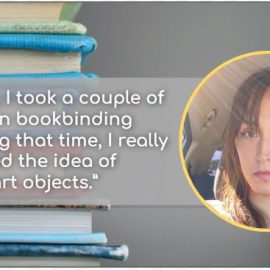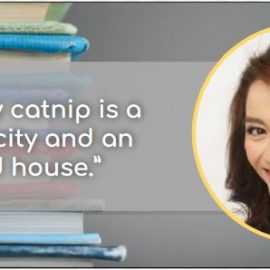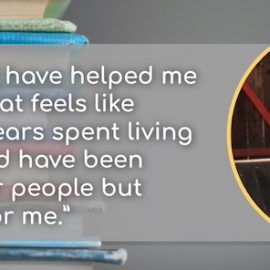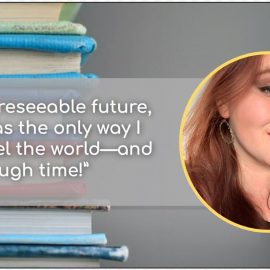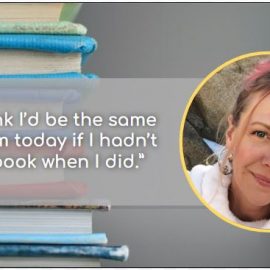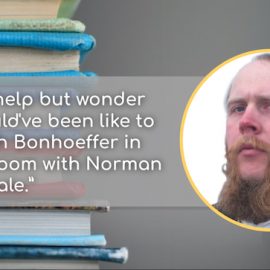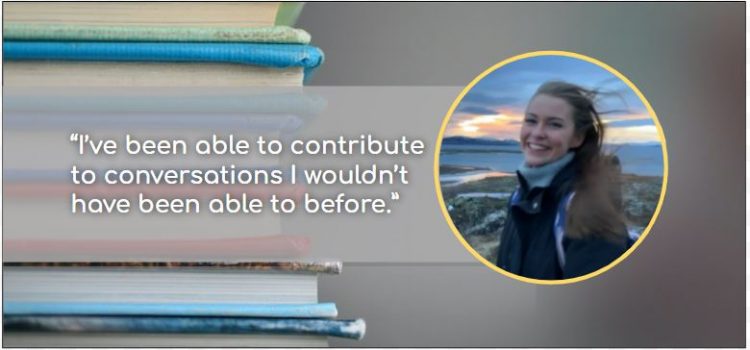
What’s so great about reading kids’ books as an adult? What’s a must-read for nature lovers?
Libby can tell you. Based near Manchester, England, she manages Shortform’s social media. We interviewed her recently to learn a bit about her relationship with books.
Our Interview With Libby
During our interview with Libby, we learned about a book that made her re-evaluate how she thinks about happiness, how the 2020 lockdowns impacted her reading preferences, and much more.
What kind of work do you do at Shortform?
I run Shortform’s Instagram, Twitter, and Facebook pages—and also do some blogging work occasionally.
What’s your favorite book and why?
Wuthering Heights is an old favorite of mine and probably always will be. I think it’s just because the story is so powerful and timeless.
Other than that, The Beach by Alex Garland is another favorite book. I’ve always romanticized the idea of living off the grid, but this book made me question that a bit!
What are you reading these days?
The most recent book I’ve read is a poetry book called The Pleasures of the Damned by Charles Bukowski. It can be a bit strange in places, but it was a good read.
At the minute I’m reading 12 Rules for Life by Jordan Peterson, which has some really interesting lessons. I’m also reading Limitless by Jim Kwik.
Next on my list is The Unbearable Lightness of Being. A friend bought it for me a while ago, and I really need to get around to reading it!
If you could have a dinner party with any three authors—dead or alive—who would they be and why?
The first would be Sylvia Plath. I just think she’d be such an interesting person to speak to. I’d have a lot of questions to ask her about her experiences and her thoughts about books.
Charlotte Brontë is one of my favorite authors, so she would be my second choice. I’d just love to find out more about how she lived and the experiences that led to her writing Jane Eyre.
Probably a bit of a cliché, but Oscar Wilde would make a great dinner party guest. I think he’d be really entertaining and fun.
What’s your favorite genre? Why does it intrigue you?
I tend to like something quite dark with a good twist at the end, so something like Fight Club or Shutter Island.
Are there any book genres or tropes that you dislike or refuse to read?
I don’t tend to read those easy-reading, romance-type books, but it’s not due to any particular dislike. Then again, I love some romance classics like Redeeming Love and Wuthering Heights.
What’s your favorite way to read a book?
I’ve not actually tried audiobooks and Kindle, so I’d have to say a physical copy.
My favorite time to read a book is when it’s raining or cold outside. I love feeling cozy while I’m reading. And I always read with a cup of tea.
What book do you think everyone should read in their lifetime?
I’m actually not sure if I think there are any books that absolutely everyone should read because everyone is so different. For example, The Great Gatsby is one of my favorite books, but I know a lot of people who probably wouldn’t enjoy it or get anything from it. I think the main thing is to read books about people who have different backgrounds and experiences than yourself.
Who are your favorite authors?
I really love Alain de Botton, as I think he has such a compassionate take on life and happiness. I also really enjoy Eckhart Tolle’s books, because he simplifies mindfulness in a great way, explaining how to be present in every moment.
How have your reading tastes changed over the years?
Up until I graduated, I only really liked fiction books—mostly classics! During all the lockdowns in 2020, I started listening to a lot of podcasts, which got me into non-fiction authors like Malcolm Gladwell, Tim Ferriss, and Johann Hari. So, since then I’ve been reading a lot more non-fiction.
Was there a specific book that sparked your love of reading?
I realized pretty young that I loved reading, and I think it started when my grandparents bought me some fairy tale magazines, with each one telling a different tale. From what I remember, there were hundreds of them. Some were recognizable—like “Snow White”—and others were less well-known. I couldn’t get enough of all the different stories!
I think for non-fiction it was probably the Horrible Histories series. My local library was selling basically the whole series for 10p each, so I was kept entertained by those for a while, reading one every night.
Do you have any guilty-pleasure books?
I’m not sure if it’s a guilty pleasure, but I still like reading kids’ books! Books like Winnie-the-Pooh and The Wind in the Willows are so wholesome, and I love reading them. They always cheer me up and remind me what’s really important in life.
What’s an interesting fact that you learned from a book recently?
I read Shortform’s guide of Outliers recently and learned about the external factors that contribute to success beyond natural talent and working hard—like background, parenting style, and even birth date. It was especially interesting to read about a man called Christopher Langan, who has one of the world’s highest IQs at 195. Despite this, he just didn’t get a break in life and never had the opportunity to succeed as you might expect him to.
Have any books you’ve read caused you to make any life changes or to develop any habits?
Thinking, Fast and Slow made me re-evaluate how I think about happiness. In the book, it says that we often judge our overall happiness based on how we’re feeling in the moment. So sometimes it’s easy to think you’re unhappy when really you’re just in a bad mood. Now that I know this, I’ve found it easier to stay more objective about things like happiness, which usually feels very subjective.
What are your favorite book adaptations and why?
My favorite adaptation of all time is the Netflix show The Durrells. I’ve watched it a few times now. I just love the family dynamics and how funny it is.
I love most adaptations of classic books like Jane Eyre, Wuthering Heights, North and South, and Little Women. There’s something really lovely about seeing all your favorite characters brought to life on the screen.
Are there any lesser-known books that you’ve read that you want others to know exist?
I’m a bit basic when it comes to choosing books and usually go with something fairly popular or well-liked. That said, The Outrun by Amy Liptrot isn’t too well-known—and it’s such a brilliant book. If you’re a nature lover, I’d definitely recommend reading that.
At Shortform, how do you go about working on a book that has viewpoints you don’t agree with?
If I’m writing a blog post about a non-fiction book I don’t agree with, I’ll usually make it clear that the opinions in the post are the author’s and not my own.
I had this when I was working on No More Mr. Nice Guy, as there are some ideas in that book that I really don’t agree with.
Are there any books you had to read for Shortform that you thought you wouldn’t like and ended up loving?
There were a few books about investments and economics that I thought might be a bit boring, but I actually ended up learning a lot. Since then I’ve noticed I’ve been able to contribute to conversations I wouldn’t have been able to before, so I think it’s pretty good to read books outside your area of interest sometimes.
What are your favorite books in the Shortform library and why?
It’s hard to choose, but I think Man’s Search for Meaning is probably my favorite, as it really makes you think about your own relationship with meaning. With non-fiction, rather than having a favorite book, I tend to have favorite lessons and pieces of advice instead.
Libby’s Recommended Reading List
- Wuthering Heights by Emily Brontë
- The Beach by Alex Garland
- The Outrun by Amy Liptrot
- Man’s Search for Meaning by Viktor E. Frankl
About the Series
At Shortform, we want to give our employees names and faces so you can get to know the people who make the magic happen. That’s why we’re doing the Shortform Reads series, where we interview our employees and share their thoughts and opinions. You can check out more employee interviews here.

